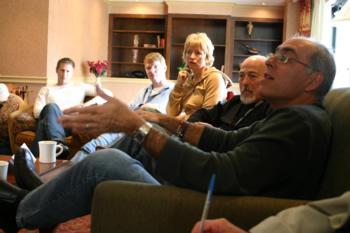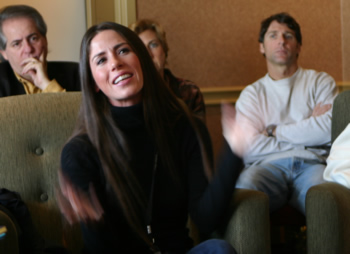Movies

New Releases • A-D • E-H • I-P • Q-Z • Articles • Festivals • Interviews • Dark Knight • Indiana Jones • John Wick • MCU
Coffee Talk: Documentaries
Jerry Blumenthal and Peter Gilbert
With the overwhelming success of Fahrenheit 9/11, documentaries are finally gaining acceptance by the mainstream filmgoing community as never before and the format is basking in what could be called its own "golden age."
Music, politics, the environment, urban society, revolutionaries, community activism, the arts and the artists who create the art are all subjects of documentaries on tap at the 27th Starz Denver International Film Festival. Of the festival's 189 films, 35 are documentaries.

As part of the festival, a group of professional documentarians mingled with those aspiring to see their projects make it to the screen as part of a "Coffee Talk" session about documentary filmmaking held at the Warwick Hotel.
The discussion's moderator, Mitch Levine, a film and stage director who was also the chairman of the World Conference on Disarmament and served as a special representative to the United Nations, is also production director of the IFP/Los Angeles Film Festival.
Joining the discussion were Soleil Moon Frye, perhaps best known as TV's Punky Brewster during the 1980s and more recently seen on Sabrina, The Teenage Witch. She recently completed a documentary, Sonny Boy, about rebuilding her relationship with her father, who has Alzheimer's.
Jerry Blumenthal is a seasoned documentary filmmaker who has directed Golub, Vietnam Long Time Coming, and the TV mini-series The New Americans.
One of Jerry's partners at Kartemquin Films, Peter Gilbert, produced Hoop Dreams and directed this year's With All Deliberate Speed.
What follows are some of the highlights from that discussion, focusing on the passions of the filmmakers and the newfound popularity of the documentary format.
Mitch Levine: What do you think the documentary is? Why do we gather to discuss them?
Soleil Moon Frye: I think it's an incredible journey. Across the span, the fact that you can explore so openly in a free society, wherever it is you live. When you bring that image, it's freedom, it's expression, it's everything, you can go to any extent.
And it's truth, you can really make truth on screen and bring it to life. I'm just inspired by them, I love them. For me, what made me want to do this documentary was the fact that I was so scared to go on this journey with my dad, and I think the camera became my protective device 'cause it was the only thing I knew how to do to get the strength, was to turn to it to art and to capture the art.
That's how the journey began for me and being a lover of documentary films, I wanted to document it so I had something to someday show my kids or grandkids. It was personal and then it became something to get the strength to share.
ML: In your early mission statement, you call the documentary and your company (Kartemquin Films), a cinematic social inquiry, a methodology for using cinema verité to promote social change. Is that still for you what the documentary film is?
Jerry Blumenthal: Yeah. It is. But social change, that too has changed over the years. For example, look at our Golub film that's here now (at the Starz Denver International Film Festival). The first part of that film that was started about 20 years ago came off of a series of documentaries that Gordon (Quinn) and I had done about social change, about health care issues and union struggles and tied very specifically to issues and topics that were directly related to things that were going on around us in the city.
There were community groups, there were labor groups, there were people fighting for change in health care and housing and education. We found a way to make movies about what they were doing that they could use. It was a very specific audience.
My fascination, my romance, with documentary comes from my love of observing people. That's really where it came from and, strangely, that's sort of where it's come around to more recently.
Peter Gilbert: I should tell you I come from an extremely political family. My mom was blacklisted, my parents were freedom writers; I come from that background. I didn't grow up wanting for anything, but I always was politically active.
Basically, it was a very apathetic time when I started making films. How do you make some kind of dent into showing people things? People really weren't willing to listen to things like they would now; they wouldn't have gone and seen Fahrenheit 9/11 at that time. I started to realize that what I really loved was storytelling. And really what we do is tell stories.
All of our films have a point of view, so when you start getting into truth, it gets very tricky. It is the truth that I see and it is my voice that echoes through those stories. If an African-American group of filmmakers had made Hoop Dreams it would've been a different film from what our film was.
You can use stories to engage people and make them think and that's what I think is the real strength of a documentary filmmaker is that a story brings you in and gets you beyond all the politics, all the sort of crap that we hear all the time, and you start to engage in people. Instead of hearing talking heads telling you this is this, this is that, this is whatever, it's those people living the life, that you get to make up your mind about what it is.
ML: It's sort of Film 101. Character and story is what drives narrative film. It's exciting to hear documentaries embrace, really, the same purpose.
Which leads to the question of "subject" and when you tell a story, how one frames a subject. Soleil, tell us a little bit about Virgil Frye and his daughter.

SMF: When I say "truth," I suppose I mean the individual truth, what's true to me. In the sense of this is my dad, I never got a chance to know him. He was a crazy, wild kind of guy, totally eccentric, he had been involved in the civil rights movement. He and a bunch of friends went with Martin Luther King into the march at Washington. He had lived this incredibly colorful life, had been a part of making Easy Rider, had been best friends with these wonderful rabble rousers.
As wonderful and colorful as he was, he wasn't much of a dad. He was, you know, the legend in his mind, a political activist and an artist, and he loved drugs and sex and women and boxing and six-time Golden Glove champion. So growing up, my mom raised me and I would see him every once in a while.
As a father, when I was looking for a father, he wasn't really there, but I always had so much respect for his history.
In this search to know my father, he continually would ask me take him back home. He wanted to go back to Iowa. And so, after all these years of him asking, I said "OK." I saw that the illness (Alzheimer's) was really progressing and this was maybe my last chance.
What was more interesting to me was the story of how we're flawed, how we're all fucked up in our own ways, how I have not always been the perfect daughter and he hadn't been the perfect father. And together, in our imperfections, I think we found each other and our true essence of each other. I think any one can relate, whether you had a parent that wasn't there or a brother or sister that you couldn't relate to in whatever way. I didn't want to make a film just about this illness, I think that's a very small part of it.
PG: I think that it's the stories of everyday people battling that are extremely compelling. When we made Hoop Dreams, we were like, you know, the thing at Sundance. We felt like we were The Beatles.
(Author's note: The problem was, after seeing the film at Sundance, people were more interested in buying the rights to remake it as a feature film. While the film did open doors for them, Peter and Jerry humorously admit the doors were more ajar than open.)
PG: What is interesting is that, and I don't mean this in a bad way, because it's fine, whatever works, a lot of the films are in a bizarre way celebrity-driven. Michael Moore is a celebrity who makes a film. And it's an amazing thing what he's able to pull off. He's done an incredible job of creating who he is.
I wouldn't know how to do that. The form now has opened up; we used to argue a lot more about form. I'm not as pedantic about all those things.
JB: It would be disingenuous, at least, to say that we're not looking for a specific kind of story. There are a lot of threads in people's lives once you choose to follow them. You have to choose the thread because there is a certain kind of story that you want to tell going in.
We are, in fact, very selective of what we choose to film.
PG: And sometimes the people you think are the good guys end up being the bad guys. Not for anything that we're imposing on them and not that they necessarily think that they're bad. In most of the films I've done there's always one or two characters who I find are just unbelievably tragic because, basically, I don't think they understand the fact; they're doing what they think is right and what's normal and all that stuff and they're actually hurting people and they don't feel as though they're doing that. And it's very difficult for them to see that.
ML: I think it's important instruction to anyone interested in exploring anything beyond their own story. It's important instruction that you need to be engaged with the subject and up front and share.
JB: How could we be in the golden age of production and the golden age of exhibition, and funding to be the worst it's ever been? That doesn't make sense to me.
Find a way to do it. I don't know that there are limits. What are the limits?
Look at this film that's at the festival now, Tarnation. This guy worked with iMovie. That's pretty limited digital technology.
It's only perfect for that story because he wanted to make that movie. He used what was out there. I'm being a little bit Pollyanna-ish here and a little bit too optimistic, I'm sure. But nonetheless, I see the new technologies opening up doors that are amazing for individuals who want to make films, who want to tell their stories.
PG: We are the punk movement now, right now, of what bloated rock 'n' roll was when punk came. That's what's sort of happening to us. Even Michael Moore is punk level compared to a Hollywood film.
• Originally published at MovieHabit.com.


